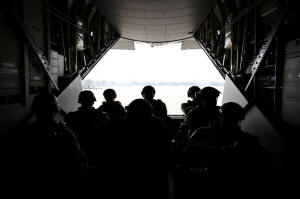U.S. commandos train for the unexpected in North Korea's shadow
 Send a link to a friend
Send a link to a friend
 [March 15, 2024]
By Josh Smith [March 15, 2024]
By Josh Smith
GWANGJU, South Korea (Reuters) - U.S. special operations troops in South
Korea are training and preparing for unexpected threats at a time when
global crises are more interconnected than ever, their commander said
during an exercise this week.
"Nothing in the history of the United States should give us any faith
and confidence that we know where the next threat is coming from,"
Brigadier General Derek Lipson of Special Operations Command - Korea
said in an interview on the sidelines of joint drills.
Nuclear-armed North Korea in recent years has made unprecedented strides
in its weapons programs, including massive new ballistic missiles that
can reach the United States and speedy new tactical missiles designed to
defeat missile defense systems.
For the first time, North Korean missiles have been fired in combat,
with Russia wielding them this year against targets in Ukraine,
according to U.S. officials and independent experts.
And in Asia, Korea joins the South China Sea and Taiwan as flashpoints
with the potential to involve the region and the world.
Because of that uncertainty, Lipson is trying to inject more flexibility
and decision making into his troops' training - not just how to shoot a
rifle, as he puts it, but deciding when and where.
North Korea has condemned the stepped-up joint drills as provocative
rehearsals for invasion and proof of hostile intent by Washington and
its allies.
Adding to this year's unpredictability are the upcoming U.S. elections,
which are being closely watched around the world.
Lipson said that although politics play a role in military matters, his
job is to ensure his troops are ready regardless of who the president
is.
"I think (North Korea) would like nothing more than senior military
leaders, junior military leaders, service members, (South Korea) and the
U.S. to be worried about the election more than they're worried about
their readiness," he said. "It's important to make sure that we
understand our role is to be ready, not to be part of the argument."

JOINT TRAINING
During drills on Thursday, a U.S. special operations MC-130 aircraft
practiced airdrops with a brigade of South Korean commandos.
As the grey turboprop aircraft circled over the Republic of Korea
Special Warfare School Training Range near Gwangju, South Korean troops
and a handful of Americans toppled from its doors, jerking and swinging
as their parachutes opened.
One U.S. special operations liaison soldier, who spoke on condition of
anonymity because his identity is operationally sensitive, said it
demonstrated that the allies can work together in a conflict.
Since 2016, U.S. special operations forces have been tasked with
countering weapons of mass destruction (WMD), a role with particular
relevance given North Korea's growing nuclear arsenal. U.S. intelligence
services say Pyongyang also operates biological and chemical weapons
programs.
Lipson said advances in North Korea's capabilities would change how a
mission might be executed.
[to top of second column]
|

Members of U.S. Special Operations Command sit on MC-130 airplane
during their military exercise with South Korea's Army Special
Warfare Command which is a part of the annual Freedom Shield joint
military training between South Korea and the United States at Seoul
Air Base in Seongnam, South Korea, March 14, 2024. REUTERS/Kim Hong-Ji

"I'm not going to talk plans, but the ability to execute those where
we're asked and when we're asked, that's readiness," he said. "And
that's what we're prepared to do."
During a visit to Army Special Warfare Command on Wednesday, South
Korean Defense Minister Shin Won-sik called on special operations
troops to hone their ability to "swiftly eliminate" North Korean
leadership during a war.
U.S. Forces Korea did not immediately comment when asked whether
U.S. troops would play a role in such missions.
The U.S. special operations presence in Korea has grown from about
50 active-duty personnel 25 years ago to a Theater Special
Operations Command with some 250 personnel, said David Maxwell, a
retired U.S. Army Special Forces colonel who served multiple tours
in South Korea.
In a war, their role could involve countering WMD, combat and
reconnaissance missions, supporting guerrilla forces in the North,
psychological operations, and post-conflict counterinsurgency,
Maxwell said.
GLOBAL IMPACT
The 10-day Freedom Shield exercises that wrapped up on Thursday saw
participation from an unprecedented number of member states from the
U.S.-led United Nations Command, which has operated as part of the
armistice since the 1950-1953 Korean War.
As a legacy of that war, which was never officially ended, the
United States keeps about 28,500 troops in South Korea, and operates
a combined command with the South Korean military.
The two sides named envoys this month to launch a new round of talks
for a defense cost-sharing deal to take effect in 2026. South Korean
media said the aim was for an agreement before the U.S. election in
November. Former President Donald Trump, who is the Republican
nominee, during his presidency accused Seoul of "free-riding" on
U.S. military might.
Lipson said a key part of special operations in South Korea was to
work with other partners around the region.
"When we talk about free and open INDOPACOM, that only comes from
those relationships, whether they're bilateral, trilateral... just
an understanding that no one is going to do any of it alone," Lipson
said, referring to the U.S. Indo-Pacific Command, which stretches
from India and Mongolia to New Zealand across the South Pacific and
Southeast Asia.
SOCKOR troops said they had recently conducted separate drills with
Thailand and the Philippines.
"Nothing happens in this theatre, greater INDOPACOM area or even
globally at this point, that doesn't have an impact somewhere else,"
Lipson said.
(Reporting by Josh Smith. Editing by Gerry Doyle)
[© 2024 Thomson Reuters. All rights reserved.]This material
may not be published, broadcast, rewritten or redistributed.
Thompson Reuters is solely responsible for this content.
 |